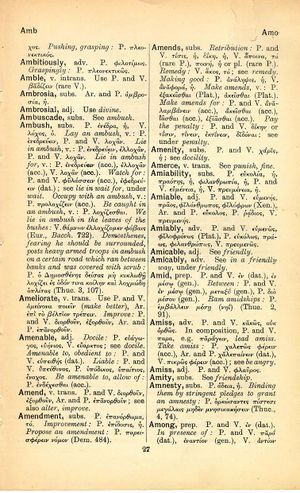ambrosia: Difference between revisions
Σοφῷ παρ' ἀνδρὶ (Σοφοῦ παρ' ἀνδρὸς) πρῶτος εὑρέθη λόγος → Apud sapientem inventa est ratio primitus → Bei einem weisen Mann fand man zuerst Vernunft
m (Text replacement - "}}]]" to "}}]]") |
(1) |
||
| Line 13: | Line 13: | ||
{{Georges | {{Georges | ||
|georg=ambrosia, ae, f. ([[ἀμβροσία]]), [[Ambrosia]], I) eig., [[als]] [[unsterblich]] Machendes: a) die Götterspeise ([[wie]] [[nectar]], der »[[Göttertrank]]«), Cic. Tusc. 1, 55. Catull. 99, 2: nulla ambr. ac [[nectar]], Varr. [[sat]]. Men. 417: dah. [[orator]] ambrosiā alendus, gleichs. [[ein]] [[Gott]] [[unter]] den Rednern, [[von]] einem vorzüglichen [[Redner]], Cic. de or. 2, 234. – [[als]] [[Futter]] der Sonnenpferde, Ov. [[met]]. 2, 120 u. 4, 215. – b) die Göttersalbe, [[ein]] Duftöl, [[ein]] [[Mittel]], das verschönert u. den [[Körper]] [[jugendlich]] [[frisch]] erhält, Sterbliche [[unsterblich]] macht, Verg. georg. 4, 415; Aen. 12, 419; [[bes]]. Ov. [[met]]. 14, 606. – c) (solöz. = [[nectar]]) der [[Göttertrank]], ambrosiae [[poculum]], Apul. [[met]]. 6, 23. – II) übtr.: a) anderer [[Name]] der [[sonst]] [[botrys]] od. [[artemisia]] [[gen]]. [[Pflanze]], türkischer [[Beifuß]] (Chenopodium [[botrys]], L.), Plin. 27, 28. – b) [[Name]] [[einer]] Traubenart, Plin. 14, 40. – c) [[Name]] eines Gegengiftes [[des]] [[Zopyrus]], Cels. 5, 23, 2 (§ 10). – u. eines andern Arzneimittels [[des]] [[Junius]] Priskus, Marc. Emp. 23. | |georg=ambrosia, ae, f. ([[ἀμβροσία]]), [[Ambrosia]], I) eig., [[als]] [[unsterblich]] Machendes: a) die Götterspeise ([[wie]] [[nectar]], der »[[Göttertrank]]«), Cic. Tusc. 1, 55. Catull. 99, 2: nulla ambr. ac [[nectar]], Varr. [[sat]]. Men. 417: dah. [[orator]] ambrosiā alendus, gleichs. [[ein]] [[Gott]] [[unter]] den Rednern, [[von]] einem vorzüglichen [[Redner]], Cic. de or. 2, 234. – [[als]] [[Futter]] der Sonnenpferde, Ov. [[met]]. 2, 120 u. 4, 215. – b) die Göttersalbe, [[ein]] Duftöl, [[ein]] [[Mittel]], das verschönert u. den [[Körper]] [[jugendlich]] [[frisch]] erhält, Sterbliche [[unsterblich]] macht, Verg. georg. 4, 415; Aen. 12, 419; [[bes]]. Ov. [[met]]. 14, 606. – c) (solöz. = [[nectar]]) der [[Göttertrank]], ambrosiae [[poculum]], Apul. [[met]]. 6, 23. – II) übtr.: a) anderer [[Name]] der [[sonst]] [[botrys]] od. [[artemisia]] [[gen]]. [[Pflanze]], türkischer [[Beifuß]] (Chenopodium [[botrys]], L.), Plin. 27, 28. – b) [[Name]] [[einer]] Traubenart, Plin. 14, 40. – c) [[Name]] eines Gegengiftes [[des]] [[Zopyrus]], Cels. 5, 23, 2 (§ 10). – u. eines andern Arzneimittels [[des]] [[Junius]] Priskus, Marc. Emp. 23. | ||
}} | |||
{{LaEn | |||
|lnetxt=ambrosia ambrosiae N F :: food of the gods, ambrosia; fabulous healing plant/juice; antidote (to poison) | |||
}} | }} | ||
Revision as of 22:50, 27 February 2019
English > Greek (Woodhouse)
subs.
Ar. and P. ἀμβροσία, ἡ.
Latin > English (Lewis & Short)
ambrŏsĭa: ae, f., = ἀμβροσία.
I Lit., ambrosia, the food of the gods (as nectar was their drink): non enim ambrosiā deos aut nectare laetari arbitror, Cic. Tusc. 1, 26, 65; Ov. P. 1, 10, 11: Suaviolum dulci dulcius ambrosiā, Cat. 99, 2.—Hence: orator ambrosiā alendus, prov. once in Cic., qs. a god among orators, of a distinguished orator (opp. faenum esse), Cic. de Or. 2, 57.— Also food for the steeds of the gods: equos ambrosiae suco saturos, Ov. M. 2, 120; 4, 215 (acc. to Hom. Il. 5, 368 and 369).—
II Transf.
A The unguent of the gods (so, ἀμβροσία, Hom. Il. 14, 170; 16, 670): ambrosiā cum dulci nectare mixtā Contigit os, Ov. M. 14, 606: liquidum ambrosiae diffundit odorem, Verg. G. 4, 415; id. A. 12, 419.—
B The name of several plants, esp. of the botrys or artemisia, Turkish mugwort: Choenopodium botrys, Linn.; Plin. 27, 4, 11, § 28.—Another plant of this name, Plin. 27, 8, 31, § 55.—
C An antidote to poison, Cels. 5, 23.
Latin > French (Gaffiot 2016)
(1) ambrŏsĭa,¹⁴ æ, f. (ἀμβροσία),
1 ambroisie [nourriture des dieux] : Cic. Tusc. 1, 65 || [servant à oindre le corps] Virg. G. 4, 415
2 botrys [plante] : Plin. 27, 28
3 nom d’un contre-poison : Cels. Med. 5, 23, 2.
Latin > German (Georges)
ambrosia, ae, f. (ἀμβροσία), Ambrosia, I) eig., als unsterblich Machendes: a) die Götterspeise (wie nectar, der »Göttertrank«), Cic. Tusc. 1, 55. Catull. 99, 2: nulla ambr. ac nectar, Varr. sat. Men. 417: dah. orator ambrosiā alendus, gleichs. ein Gott unter den Rednern, von einem vorzüglichen Redner, Cic. de or. 2, 234. – als Futter der Sonnenpferde, Ov. met. 2, 120 u. 4, 215. – b) die Göttersalbe, ein Duftöl, ein Mittel, das verschönert u. den Körper jugendlich frisch erhält, Sterbliche unsterblich macht, Verg. georg. 4, 415; Aen. 12, 419; bes. Ov. met. 14, 606. – c) (solöz. = nectar) der Göttertrank, ambrosiae poculum, Apul. met. 6, 23. – II) übtr.: a) anderer Name der sonst botrys od. artemisia gen. Pflanze, türkischer Beifuß (Chenopodium botrys, L.), Plin. 27, 28. – b) Name einer Traubenart, Plin. 14, 40. – c) Name eines Gegengiftes des Zopyrus, Cels. 5, 23, 2 (§ 10). – u. eines andern Arzneimittels des Junius Priskus, Marc. Emp. 23.
Latin > English
ambrosia ambrosiae N F :: food of the gods, ambrosia; fabulous healing plant/juice; antidote (to poison)

